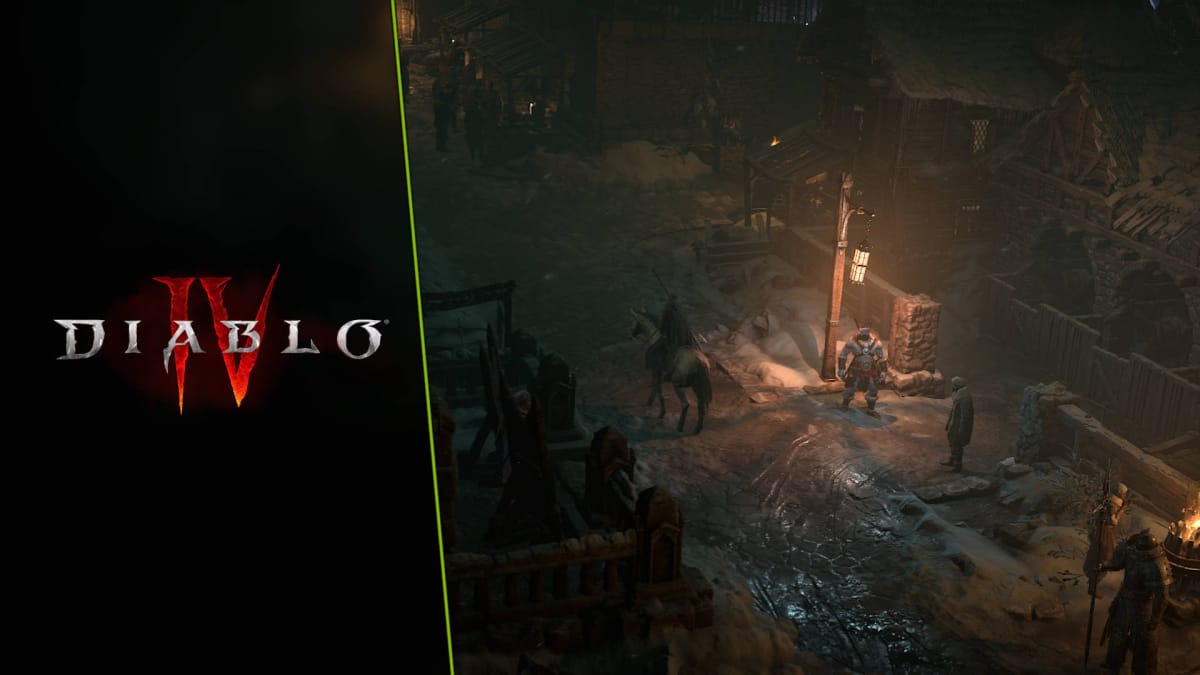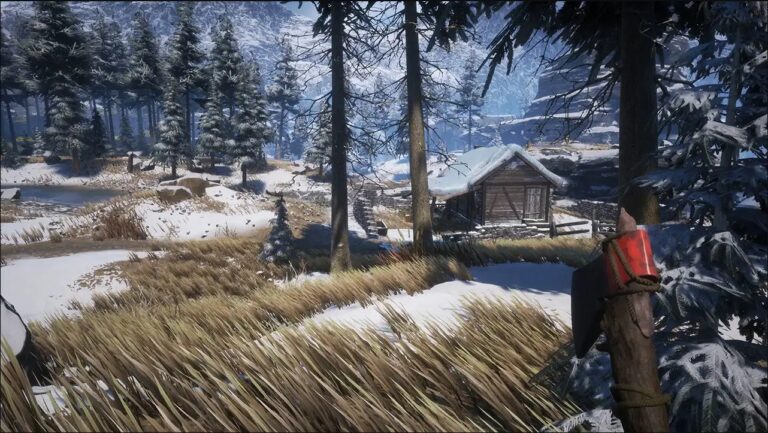
Our Diablo IV Starter Guide will tell you what you need to know to get started playing Blizzard Entertainment’s action RPG set in the world of Sanctuary.
Diablo IV HUD Explanation
Diablo IV will once again take you to the realm of Sanctuary. Humanity is caught in the middle of a war between Heaven and Hell — this time, a demonic woman named Lilith has arrived in the world and is slowly spreading her influence across the land.
Lilith’s influence can most easily be seen through the proliferation of her Altars of Lilith throughout the world. Before we dive into the Starter Guide proper, let’s break down the HUD so you know what you’re looking at while you play:

- Enemy Information – This shows the Name, Level, Health, and Special Abilities of the enemy you’re currently targeting. In this example, the Fallen Shaman is an Elite with the Multishot Ability.
- Location and Time – This shows where you are in the game world and the current time of day in the real world.
- Minimap – This section of the HUD shows you a small version of the Map.
- Objectives – This shows your current Quest(s) and what your objectives are.
- Party – If you are joined by another player and/or a friendly NPC, their status and health bars will appear here.
- Health – This shows how much Health you have left. If it reaches 0, you die.
- Potion Charges – This shows how many Potion Charges you have. Using a Potion will start a short cooldown.
- Experience Bar – This shows your current Level and how much progress remains until you reach the next Level. You can hover over this bar to see exactly how much Experience you need to reach the next Level.
- Hotbar – This shows which abilities you currently have equipped and to which buttons.
- Dodge Charges – This shows how many Dodge Charges you currently have. Using a Dodge will start a cooldown of around 10 seconds.
- Resource Bar – This shows your Character’s special Resource and how much you have. In most cases, this Resource will be Mana that slowly recharges over time. Certain characters have unique Resource mechanics that behave differently; for example, the Barbarian builds up Rage by attacking and expends it with special attacks.
- Unspent Skill Points – When you gain a Level, you’ll also gain a Skill Point to spend. This button pops up when you have unspent Skill Points as a reminder.
- Chat Window – This is where you’ll see text communication and other text notifications.

Diablo IV Starter Guide
Now it’s time to get going with our Diablo IV Starter Guide! We’ll walk you through the early parts of the game until you make it to the first major town Kyovashad
Choosing Your Class
Your first step will be to choose your Class. There are five Classes to choose from in Diablo IV:
- Barbarian – This Class is all about melee damage. Uniquely, the Barbarian has a Rage meter instead of a Mana meter and has the ability to equip a total of 4 weapons through its “Arsenal” system.
- Necromancer – The Necromancer returns yet again, along with its ability to produce an army of the dead. Necromancers can be tricky to play for people new to Diablo, but they can evolve into a formidable fighter once you get the hang of them.
- Sorceress – The Sorceress specializes in ranged magical attacks. There are three types of magic available. Cold, Fire, and Lightning. Each discipline has its strengths and weaknesses, but Cold is a solid early-game choice due to its ability to slow down incoming enemies.
- Rogue – The Rogue is somewhat of a hybrid between Diablo II’s Amazon and Assassin. Rogues can opt to attack from range with a Bow, fight in melee with daggers, or use a mix of the two.
- Druid – Druids have the power to shapeshift, summon allies to help them in combat, and wield the forces of nature as destructive magic. Much like the Necromancer, the Druid can be a tricky class for new players.
Each class has its upsides and downsides. Beyond these basic descriptions, the only way you’ll find out whether or not you vibe with a class is by playing with it. Everyone gets 10 character slots, so that gives you plenty of room to experiment!

Creating Your Character
Once you’ve chosen a Class, your next step is to customize the look of your Character. You’ll first have to choose between a man or a woman. Then, you can choose from a number of preset looks as a baseline. Your Character’s appearance can be further customized if you so choose.
It’s important to note that you can change some small elements of your Character’s look after you create them — the Markings and Jewelry can be changed to whatever you like in the Wardrobe in Kyovashad. However, you cannot change your physical appearance or sex after Character creation, so make sure you’re satisfied with how everything looks!
Beginning Your Adventure
Whatever Class you choose, you’ll enter the world of Sanctuary in the southwestern area of Fractured Peaks, the zone where Act I takes place. Your first objective will be to head to a small village and fight enemies along the way.
If you make a point of seeking out enemies, you’ll likely gain your first Level. This increases the power of your character, but it also gives you access to your first Skill Point.

Learning New Skills
Diablo IV features a return to a somewhat more traditional Skill system. Every Level, you’ll get 1 Skill Point that you can invest in learning a new Skill or upgrading one you already have. Skills are separated into tiers which can only be unlocked by spending a certain amount of Skill Points in total.
As with many modern ARPGs, Diablo IV offers the ability to refund all of your Skill Points for a nominal cost. Don’t be afraid to experiment, but keep in mind that a lot of your power comes from your gear — it’s probably not a good idea to keep respeccing all the time.
Arriving in Nevesk
After a few short fights, you’ll arrive in the town of Nevesk. You can chat with the townsfolk, get healing, and even purchase some new equipment from a small selection of items.
One of the people here will have a classic early-game Diablo quest — a great evil is located in a nearby dungeon and it’s your job to take care of it. It’s time to dive into the real meat of Diablo IV and explore a dungeon.

Exploring the Abandoned Halls
The Abandoned Halls can be found a short distance away from Nevesk. You can spend some time exploring the surrounding area, but there isn’t any exceptional loot that makes thorough exploration worthwhile — it’s totally fine to just dive right in.
This dungeon is split into three areas. After you clear the Abandoned Halls, you’ll head down into a corrupted area called the Hell-Touched Corridors. This is where you’ll encounter the Fallen, another classic Diablo enemy. Make sure to kill any Fallen Shamen first since they can resurrect other slain Fallen.
The third and final area is the Chamber of Calling. It seems relatively quiet and there isn’t much of interest in the room save for a decapitated priest. Interact with this corpse and you’ll summon your very first boss.

Defeating X’Fal The Scarred Baron
X’Fal the Scarred Baron is your introduction to boss fights and their core mechanics. Take note of the little red arrows on X’Fal’s health bar — that indicates when Potion Charges will drop, allowing you to heal any damage you may have received.
This boss has a fairly simple attack pattern — he’ll choose from one of the following attacks:
- Melee swipe
- Smashing the ground three times
- Shooting a wave of red fireballs
- Jumping into the air and landing somewhere else
- Summoning some hellhounds
Take your time carefully avoiding attacks and doing what damage you can to X’Fal. Once he’s defeated, you can exit the dungeon via the wheel menu or by walking out. Head back to Nevask.
Betrayal at Nevask and the Hermit’s Cabin
Your return to Nevask is met with a celebration. Unfortunately, it turns out that it’s all a trap — the townspeople are actually cultists and you’re about to be the next sacrifice.
Fortunately, you’re saved by an unlikely ally. You’ll learn a little more about Lilith and the story. Next, you’re charged with making your way to the Hermit’s Cabin.
Fight your way through the snow to the marked location. As you get closer, you’ll find resources on the ground and near the walls of the area — pick them up for later. When you make it to the cabin, interact with the bookcase and then the skull to trigger a cutscene where you meet Lorath Nahr.
Arriving at Kyovashad
Lorath Nahr instructs you to head to Kyovashad, the central hub for the Fractured Peaks region. You’ll have a few fights along the way as usual, but it is otherwise a fairly uneventful trip. You’ll have to perform a simple ritual at the gates to enter the town.
Kyovashad is much bigger than the tiny village of Nevask and it has a lot of services available — here’s what you can find in the town.
Diablo IV Kyovashad Map

- Stash and Wardrobe – The Stash is where you can store excess items. Your Stash is shared between all of your Characters on the Realm. The Wardrobe allows you to change the look of your character and customize the look and color of your equipment using designs that you’ve unlocked at the Blacksmith by destroying items.
- World Tier Statue – This statue is where you can change your difficulty level.
- Rings & Amulets Vendor and Jeweler – the Rings & Amulets vendor sells Rings and Amulets. You won’t be able to buy Rings until Level 10. The Jeweler allows you to combine Gems for a fee once you reach Level 20.
- Occultists – Occultists can use arcane magic to customize your items or break them down into materials.
- Side Quests – Your first Side Quests are available in Kyovashad.
- Waypoint – Waypoints allow you to instantly teleport between static locations. You can also take a Town Portal to any unlocked Waypoint from anywhere in the world simply by clicking on the Waypoint on the Map.
- Stable Master – This is where you will be able to access a Mount once you complete the necessary Quest to unlock them.
- Alchemist – The Alchemist can make Elixirs for you which will give you beneficial effects, including a 5% Experience bonus. You can also upgrade the quality of your Potions every 10 Levels, starting at Level 10.
- Healer – The Healer will instantly restore your Health to full for free.
- Weapons and Armor Vendors – These two people will sell you Weapons and Armor appropriate for your current Class.
- Blacksmith – The Blacksmith can repair your items, destroy items to unlock their cosmetic look for the Wardrobe, and upgrade your items once you’ve leveled up a little bit.
Lorath’s Goodbye
Speak with Lorath once you’re in Kyovashad and he tells you that he’ll be leaving soon. He needs you to go to the Weapon vendor and get back his polearm. You’ll have to pay a small fee of 20 Gold, but this is otherwise a fairly simple fetch quest.
Return the polearm to Lorath and a small cutscene will play as he leaves the town. This moment is when the world of Diablo IV truly opens up to you. You can immediately continue with the main story or you can choose to explore the land — I highly recommend spending some time tracking down all of the Altars of Lilith in Fractured Peaks as an easy way to power up your character.
You should now have a solid understanding of the basics of Diablo IV. Get out there and have fun adventuring in the world of Sanctuary, and make sure to check out our other Diablo IV guides!

Diablo IV F.A.Q.
What is Diablo IV?
Diablo IV is an action RPG where players have to fight demons in the world of Sanctuary. As the name implies, it is the fourth core game in the Diablo series.
Is Diablo IV Multiplayer?
Yes, Diablo IV supports online multiplayer.
Where is the Diablo IV Save File?
The Diablo IV save files are stored on Blizzard Entertainment’s servers, so you cannot access them.
What Happens When You Die in Diablo IV?
If you die in Diablo IV, your character will remain in a ghost form at the place of your death. Another player in your party can revive you. If they are unavailable (or you are solo), you will have to respawn. Respawning will cause you to lose 10% of the durability of your equipped items and you’ll appear at a nearby Checkpoint.
Can You Play Diablo IV Offline?
No, you cannot play Diablo IV offline.
Is Diablo IV Crossplay?
Yes, Diablo IV is Crossplay as stated in this Blizzard news post.
Does Diablo IV Have Cross-Progression?
Yes, Diablo IV has Cross-Progression as stated in this Blizzard news post.












+ There are no comments
Add yours